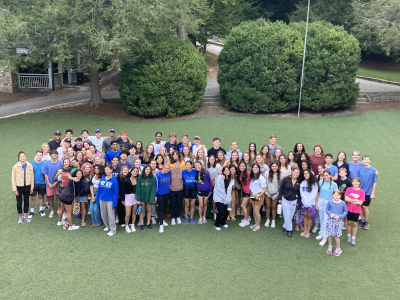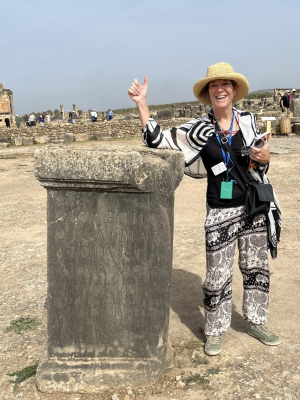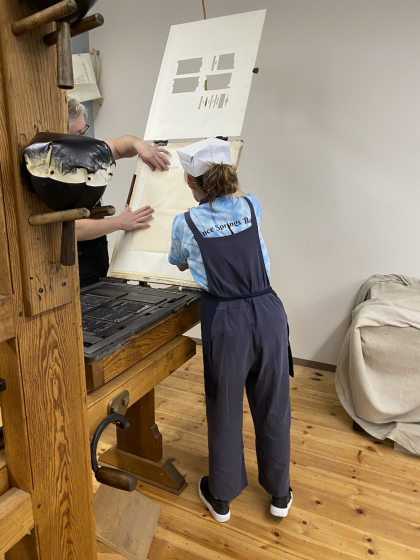Jed Atkins
I continue to work on Cicero and Roman political thought, and the last academic year saw the publication of several articles and book chapters on these topics: “The Political Theory of Cicero’s De Officiis,” in Cicero: De officiis, Klassiker Auslegen. Philipp Brüllmann and Jörn Müller, eds. Berlin: De Gruyter, 2023; “Roman Republicanism,” for The Oxford Handbook to Republicanism, Frank Lovett and Mortimer Sellers, eds. Oxford: Oxford University Press (in‐press; published online, June 2023); “Patriotism and Cosmopolitanism in Cicero’s De officiis,” in Cicero’s De officiis: A Critical Guide, R. Woolf, ed. Cambridge: Cambridge University Press, 2023, pp. 203‐223 (peer‐reviewed); “Cicero on the Justice of War,” Power and Persuasion in Cicero’s Philosophy, Nathaniel Gilbert, Margaret Graver, and Sean McConnell, eds. Cambridge: Cambridge University Press, 2023, pp. 170‐204. My next book, The Christian Origins of Tolerance, is now under contract with Oxford University Press, and the final version of the manuscript is due later this fall.
Transformative Ideas launched a Living‐Learning Community devoted to civil discourse about life’s big questions. Their programming will connect to the Fall 2023 TI LLC classes—we now have 250 sophomores enrolled in 9 classes. I am heartened to see that this model is already impacting student culture around issues of loneliness, isolation, and meaninglessness. Our students’ informal motto is to be empowered to search for truth, purpose, and meaning in their lives without the pressures to perform. This fall I will be teaching “The Good Life: Religion, Philosophy, and Life’s Ultimate Concern” to 115 students. Veterans of the course will be leading dialogue groups in the lovely common room of the TI Dorm. See the attached picture of 85 students, faculty, and faculty family at a tech‐free retreat in the North Carolina Mountains.
Another undertaking that came to fruition last year in partnership with my faculty colleagues‐‐especially the tireless work of our then‐DGS‐‐Lauren Ginsberg—and the Duke administration was the creation of a Bridge‐to‐the‐PhD Program to remove barriers to access for talented students from disadvantaged socio‐economic statuses. We welcome our first student to campus through this program this summer.
Tolly Boatwright
Still working on Agrippina the Younger's biography, I will “chase Agrippina” in Italy this fall. Besides visiting Ponza, her exile island, and Bauli and Bacoli, where Nero had her murdered in Campania, I will go to Mevania (in Umbria). In Agrippina’s villa there in 53 a young woman spontaneously changed into a man on her wedding eve!
Other research and teaching remain fun and rewarding. I directed the Senior Honors thesis of David Mellgard, “Claudius’ Conquest of Britain: The Importance of Cultural Capital in the Early Roman Empire” (it won High Distinction and the Taggart Prize). Meeting David weekly reminded me vividly of the joys of Duke teaching. In spring 2023 I presented “The Kith and Kin of Hadrian” to B. Burrell’s UCinci grad seminar, “The Archaeology of Hadrian's Empire.” I happily was the faculty liaison for two Duke Travels programs in 2022‐23. For Moroccan Discovery (10/22) my presentations were on Roman cities/citizenship, and the edges of Rome’s world. For From Ireland to Iceland (6/23), I discussed resistance to the Roman empire (& British women’s particular roles), and Ultima Thule. I attach a photo from the stunning site of Volubilis, Morocco.
Because 2025 is a Jubilee Year, the Centro’s 60th Gala in Caput Mundi is postponed until 2026. It will be a 61st rather than 60th Gala, but even Claudius fiddled with the staging of the Saecular Games. Keep in touch!
Cassandra Casias
I was invited to contribute to the Oxford Research Encyclopedia of African History, a peer‐reviewed online publication which brings together scholars of Africa in vastly different time periods. My entry, “Women in Late Antique North Africa (In the Writings of Augustine and Other Church Fathers),” came out in September. Soon, the Bulletin of the American Society of Papyrologists will also publish my work on a supply order from late antiquity.
For my fall Roman Law course, I received a grant from the David L. Paletz Innovative Teaching Fund to invite to campus a scholar on Roman slave law, Katherine Huemoeller (University of British Columbia). Dr. Huemoeller gave a talk on campus and did a guest lecture in my class, both of which continued to inspire comments during class discussions for the rest of the semester.
In May, soon‐to‐be Dr. Antonio LoPiano and I led an enthusiastic bunch of students through the ancient sites around Naples, Pompeii, and Rome during the Duke in Rome 2023 summer course.
Rex Crews
The 2022‐23 academic year has been one of the most enjoyable in memory in terms of students in Elementary, Intermediate, and Refresher Latin. I cannot recall more dedicated and enthusiastic students and am happy to report that some are already indicating an interest in a minor or major in Classical Studies or Languages. We were fortunate to have excellent and seasoned graduate instructors, Mason Barto, Melissa Baroff, Michael Freeman and Alex Karsten teaching in the program, as well as visiting scholar, Dr. Courtney Evans.
Later this month Mason, Michael and Alex will be particpating in a discussion of elemtary Latin pedagogy with the new faculty and graduate students at UNC. We shall be discussing Elementary Latin in the General Education Curriculum and then give teaching demonstrations. We are especially delighted to have Michael and Alex, recently minted PhD’s teaching Latin and Greek with us this Fall. I am very much looking forward to this year ahead.
Lauren Ginsberg
My update focuses on this past summer which involved a lot of various academic adventures! First up was being the faculty host for a Forever Duke Alumni trip to Sicily and Southern Italy. And I lucked out to have on this trip Duke alumna and veteran Latin teacher Diann Nickelsburg and her husband Mike! We shared tales of traveling with students, marveled at some newly opened spaces in Pompeii, and enjoyed sharing tidbits about all things Latin pedagogy. I couldn’t have asked for a better fellow traveler! See us below in the Baths of Neptune at Pompeii. It was a lot of fun and I can’t wait to get to host again on another trip!
Next up was a National Endowment for the Humanities Summer Institute on the Performance of Roman Comedy run by Classicists Ted Gellar‐Goad (Wake Forest) and Chris Polt (Boston College). The seminar lasted for four weeks in Boston and featured daily seminars led by experts on topics like Roman music, acting and mask work, theories of adaptation, violence, slavery, imperialism and colonialism, reception, and much more! While we spent our mornings in “school,” every afternoon featured several hours’ work on scenes that we were all prepping for performance at the end of the institute. We got free rein to adapt our assigned scenes, do our own translations, set the scene in any time we want, and find the best costumes to bring our vision alive. One of my groups chose to work with the reproduction Roman theatrical masks that the organizers of the institute had commissioned.
I was excited to take part in this institute for what it would bring to my research on Roman tragedy but also for the ways I can take this experience and enhance my Theater of Rome - course ‐ especially when it comes to the practical realities of staging Roman comedy in antiquity and today. It was also fun to be “back in the classroom” myself as a student.
The rest of my time focused on my current book project, a biography of Nero’s first wife Claudia Octavia. At one point she was clearly the most beloved female public figure in Rome, but the life that survives to us in the written and material sources is incredibly fragmentary. We can’t even say the year in which she was born! And the circumstances of her death ‐ executed on a manufactured charge of treason ‐ means that very few images of her remain. But the story of her life that I hope to recover from the fragments gives us a fascinating glimpse into the life of a young woman raised at the center of imperial family who experienced significant childhood trauma, who was beloved since infancy by the common people, the army, and the Senate, who inspired a revolution against the man who wanted to divorce her, and whose legacy lived on especially in plays that stage Nero’s Rome. It’s been a lot of fun working on how best to tell her life story!
For now I’m excited to get back into the classroom with my Theater of Rome course this Fall and Age of Nero in the Spring!
Alicia Jimenez
This past academic year I continued teaching at Geer Cemetery in the context of the "Durham Black Burial Grounds Collaboratory" grant (Trinity College). I had the pleasure to work with Adam Rosenblatt (P. I., International Comparative Studies), Ed Triplett (Art, Art History and Visual Studies) and Debra Taylor González (President of the Friends of Geer Cemetery) in preparing a series of fieldtrips to the cemetery for undergraduates. We discussed with students the history of the African American community in Durham, the segregation of cemeteries and the information they provide about social structure. Through hands‐on activities, the students also learned how archaeologists use photogrammetry to create 3D models of monuments to study and preserve accurate copies of them.
Thanks to a Duke‐Exeter Initiator grant, my colleagues Ioana Oltean and Joao Forte (Exeter University) and I organized in the Fall a workshop at Duke titled “Conflict and displacement in the Roman Empire: new approaches to the study of the Roman army in the west”. The conference explored the materialities of the Roman conquest and its implications for indigenous mobility and migration patterns within some of the western provinces of the Roman Empire (Hispania, Dacia and Britannia). In the spring, together with Kate Morgan and Adam Rosenblatt, I contributed to the organization of the visit to Duke of Michael Blakey, the scientific director of the New York African Burial Ground Project (1992–2009), the oldest and largest known excavated burial ground in North American for both free and enslaved Africans. A leading voice in the debate over the need to confront structural racism in archaeological and museological practice Prof. Blakey gave a public talk and led a seminar for graduate and undergraduate students at Duke (for a reflection by Duke undergraduate Olivia Ares see: https://researchblog.duke.edu/2023/04/11/one-mans-death-is-not-another-…). I received invitations to present a paper for the AIA New York Society and at Brown University (co‐authored with A. Rosenblatt) at the conference “Writing Global Histories Today” organized by Yannis Hamilakis and Felipe Rojas. Later in the year I gave a key‐note paper at the conference “A Roman World? Imperial Expansion and Provincial Communities,” organized by Sailakshmi Ramgopal at Columbia University.
My second book manuscript was peer‐reviewed this year and I signed a contract with Cambridge University Press. I published an article with new data about the layout of the camps near Numantia (Renieblas, Spain) in the Journal Treballs d’Arqueologia, and the entry on Numantia in the 2nd revised edition of the Atlas of Classical History (edited by Richard J. A. Talbert, Lindsay M. Holman and Benet Salway). A translation in simplified Chinese of the volume A Cultural History of Money in Antiquity, for which I had written a chapter on the archaeology of coins three years ago, was published in 2022.
At the end of the spring semester of 2023, I was awarded tenure at Duke. I am looking forward to participating in the academic life of the university and contributing to foster further links between Duke, the Mediterranean and the Hispanic community.
William Johnson
Looking back, I find that my last PHEME entry was my Chair’s letter after the non‐graduation in May 2020. Shortly after, in the midst of the summer 2020 crisis, I was suddenly called on to join the Trinity leadership. Suffice it to say that it’s been quite the ride during my three pandemic‐inflected years as Dean of Humanities & the Arts. In those years, I did however have the tremendous joy of directing three excellent and very different dissertations, those of Nick Wagner (’21), Michael Freeman (’23), and Sinja Küppers (summer ’23). And I kept myself whole by spending our many weekends in isolation on my Classics research, completing five articles and one as‐yet‐unpublished born‐digital project. (See profwilliamjohnson.com for details.) The paired commitment to university service and scholarly contribution has made for a rich life, despite it all.
Francis Newton
My article on "the mystery of Ovid's exile" (title of Thibault's book) appeared in May: "Ovid, Met. 1: Jupiter's Plebeians, the Titles of Augustus, and the Poet's Exile, Harvard Studies in Classical Philology 112 (2022), pp. 393‐435.
Erika Weiberg
I am just back from a summer of research in Athens, Greece, where I finished the copy edits for my book, Demanding Witness: Women and the Trauma of Homecoming in Greek Tragedy, which is forthcoming from Oxford University Press in February 2024. Look for it on your library shelves soon! This past academic year I gave a series of lectures on my forthcoming book at schools from Agnes Scott in Atlanta to Yale in New Haven. I also taught Ancient Myth in the Spring, in which students produced their own podcasts on ancient myths, and Drama of Ancient Greece in the Fall, which involved a trip to a local movie theater for a screening of the Met Opera’s Medea! I look forward to another exciting year of teaching and research ahead.
Shirley Werner
Summer is an especially delightful time for me not only because our daughter is home from college and because it’s tomato sandwich season but because I can turn my attention wholly to my own scholarship. (I work only three‐quarters time for APh during the academic year.) Four articles I’ve worked on over the last two or three years are all seeing publication this summer: “The Rules of the Game: Imitation and Mimesis in Horace, Epistles 1.19” in HSCP 112; “Two Unnarrated Stories in Horace’s Roman Odes (Carm. 3.2.1–12 and 3.6.21–32): Echoes of Vergil’s Unfinished Aeneid and a Lowlife Epigram” in Antichthon 57; “Horace‐as‐Alcaeus (Odes 3.6) Impersonates Horace‐as‐Archilochus (Epodes 7 and 16): Persona and Poetic Autobiography in Horace” in AJP 144 (2); and “Poetic Discourse, Rhetoric, and Augustus in Horace’s Regulus Ode (Hor. Carm. 3.5)” in Mouseion (Canada) 20 (2).
Clare Woods
In Fall 2022 I enjoyed my second semester of sabbatical (after stepping down as Director of the Thompson Writing Program). My goal was to complete the sample chapter for my book‐in‐progress, provisionally entitled, Books on the Road: Manuscripts and Social Networks in Carolingian Francia. For the sample chapter, I wanted to take a fresh look at the early career of a famous Carolingian scholar, Hrabanus Maurus. As typically happens, the process of writing up the material evolved my thinking in many ways. While I thought I’d be writing a chapter in two halves (biographical context, then an exploration of the surviving manuscript evidence), by sabbatical’s end I realized I needed two full chapters to do justice to the data and my ideas about it. When I returned to teaching in Spring 2023, I focused on revising and reworking my manuscript data for what will now be the second sample chapter. I currently have two presses potentially interested in the book and am planning to submit a proposal by the end of the summer. In July, I gave a paper at the International Medieval Congress in Leeds, UK on material that will form part of a further chapter of the book. The paper was entitled, “Manuscripts on the Move: Monasteries, Travel, and the Circulation of Texts.” It was wonderful to attend the IMC again and meet up with fellow medievalists I haven’t seen in many years. I left full of ideas for a panel for next year’s congress. On different research/publication topics, I composed two short articles for Philological Practices: A Comparative Historical Lexicon, to be published by Princeton University Press. Additionally, I had a paper accepted (“Greek Science in the Margins”) for a conference on Pliny the Elder and Traditions of Natural Histories to take place in October 2023 at Binghamton’s Center for Medieval and Renaissance Studies. This Pliny paper will allow me to dip back into my research on the Rubenstein Library’s early printed (and heavily annotated) copy of Pliny’s Natural History.
In Spring 2023, I taught two undergraduate classes: Latin Epistle and the Capstone Seminar. For Latin Epistle, we read extracts from the correspondence of the twelfth‐century intellectuals and lovers, Heloise and Abelard. For the Capstone Seminar, I developed a course on the theme of the Afterlife of Classics. I really enjoyed exploring with a fantastic group of students the influence of the ancient world on literature, art, architecture, popular culture, politics and more. Looking forward already to teaching History of the Book again in Spring 2024, I applied to and was accepted for the Book History Workshop at Texas A&M. For a week in June, I experienced what it would have been like to work at an eighteenthcentury press. We struck matrices, cast and dressed type, spent many hours setting it, and printed our efforts on a hand press. We also tried our hand at linocuts, wood‐cuts, and wood‐engravings, made and marbled paper, and bound what we’d printed into a pamphlet format. Additionally, we got to explore the history of the book through A&M’s rare book and manuscript collection. The workshop was hugely inspiring and has certainly renewed my commitment to learning through doing/making. If only I can acquire a tabletop press before Spring 2024…






